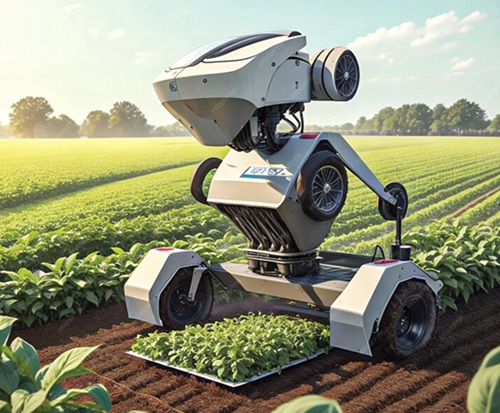Agriculture is the bedrock of economic sustainability in most developing countries.
It plays a key part in long-term economic growth and structural transformation.
In the past, agricultural activities were limited to food and crop production but in the last two decades it has evolved to processing, production, marketing and distribution of crops and livestock products.
Currently, agricultural activities serve as the basic source of livelihood, improving GDP, being a source of national trade, reducing unemployment, providing raw materials for production in other industries, and overall development of the economy.
With the global geometric population rise, it has become imperative that agricultural practices are reviewed with the aim of proffering innovative approaches to sustaining and improving agricultural activities.
AI in Agriculture
The introduction of artificial intelligence (AI) applications to agriculture will boost other technological advances, including big data analytics, robotics, the availability of cheap sensors and cameras, drone technology, and even wide-scale internet coverage on geographically dispersed fields.
With the application of AI technologies, the impact on natural ecosystems can be reduced, and worker safety may increase, which in turn will keep food prices down and ensure food security to keep pace with the increasing population.
The common problem in many developing countries is managing the agricultural land as a single unit without considering the variability within the field which leads to low input use efficiency, increased environmental pollution and reduced returns to the farmer.
AI can give farmers massive amounts of information in real time, such as weather, temperature, humidity, and market price, as well as propose the best mix for any specific condition by fully understanding available resources.
Crop varietal
selection and health
Emerging technologies have aided in the best crop selection and have even improved the selection of hybrid seed options that are best suited to the needs of farmers based on many characteristics such as soil condition, weather forecast, type of seeds, and infestation in a specific location, among others.
Various plant sensors have been developed to track plant growth as well as identify plant illnesses.
Crop health monitoring, irrigation equipment monitoring, weed identification, livestock and animal monitoring as well as disaster management can be done with the use of AI tools in agriculture.
Smart irrigation
Irrigation is a highly labour intensive operation, especially in high water demanding crops like rice, sugarcane, banana, etc.
Automation in agriculture is gaining importance across the world.
With the use of sensors (moisture, temperature, humidity) which are buried in the root zones of the crops and powered by solar panels can be controlled via a wireless internet network for automated irrigation.
Insect pest and disease management
Speedy accurate identification and taking corrective steps using real time data could minimise the yield loss.
The sensors in the field or drones are connected to on-board electronic systems which transmit the data to an internet server, where images are processed, insects and diseases identified and counted.
Depending on the severity of the infestation, the use of agrochemicals may or may not be required.
Predictive analytics
AI systems are providing predictive insights such as, which crops to grow in a particular season and location.
It is also guiding the farmers about optimal dates of sowing and harvesting in a specific area, thereby reducing damages and improving crop yields.
It is used in insect pest and disease forecast, market demand and price forecast.
Precision agriculture
Precision agriculture reduces the pressure of agriculture on the environment by allowing more efficient use of agricultural resources.
Using advanced technologies such as satellite surveillance, sensor, and unmanned aircraft surveillance of fields, engineers have been able to train AI systems to optimise the use of inputs on a precise level thus maximising yields while conserving resources.
Advantages of AI Applications
AI decrease the uncertainty and risk in agriculture operations and production as well as enhance the preparedness of farmers to handle the different types of crisis.
Prediction of future situations and issuing advisories for sowing, pest control and commodity pricing, among others.
AI provides site-specific management of crops including saving of input resources and increased efficiency of input applied.
AI in conjunction with remote sensing technology can play a crucial role in implementing Climate Smart Agriculture on a large scale.
Challenges
The majority of farmers in developing nations are small and marginal landholders with their financial risk-bearing capacity generally very low.
The cost involved in implementing AI in agriculture is beyond the affordability of small holder farmers.
To train robots and produce exact predictions, AI systems require a large amount of data.
Extensive testing and validation of emerging AI applications in the field are very important as agriculture is affected by environmental factors that cannot be controlled, unlike other industries. It is highly required now that farmers are trained in modern AI technologies.
Recommendations
AI is a modern digital frontier that will have a massive impact on the world, transforming the way we live and work.
Agriculture is undergoing transformation as a result of AI.
The World Economic Forum is considering AI as the lynchpin of the Fourth Industrial Revolution.
AI-related inventions are booming, shifting from theory to commercial application.
Climate change, population expansion, employment concerns, and food security issues are just a few of the issues that this technology can solve.
In this context, the use of latest technological solutions to make farming more efficient remains one great necessities.
Present strategies to intensify agricultural production require high energy inputs and market demands high quality products.
The written is the Registrar, Chartered Institute of Agriculture
Email: kashiagbor@yahoo.com

